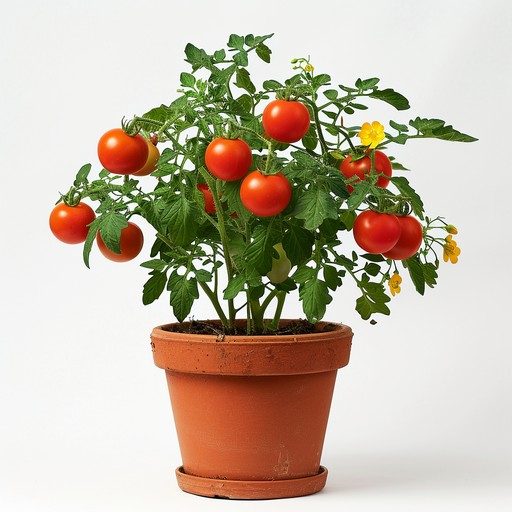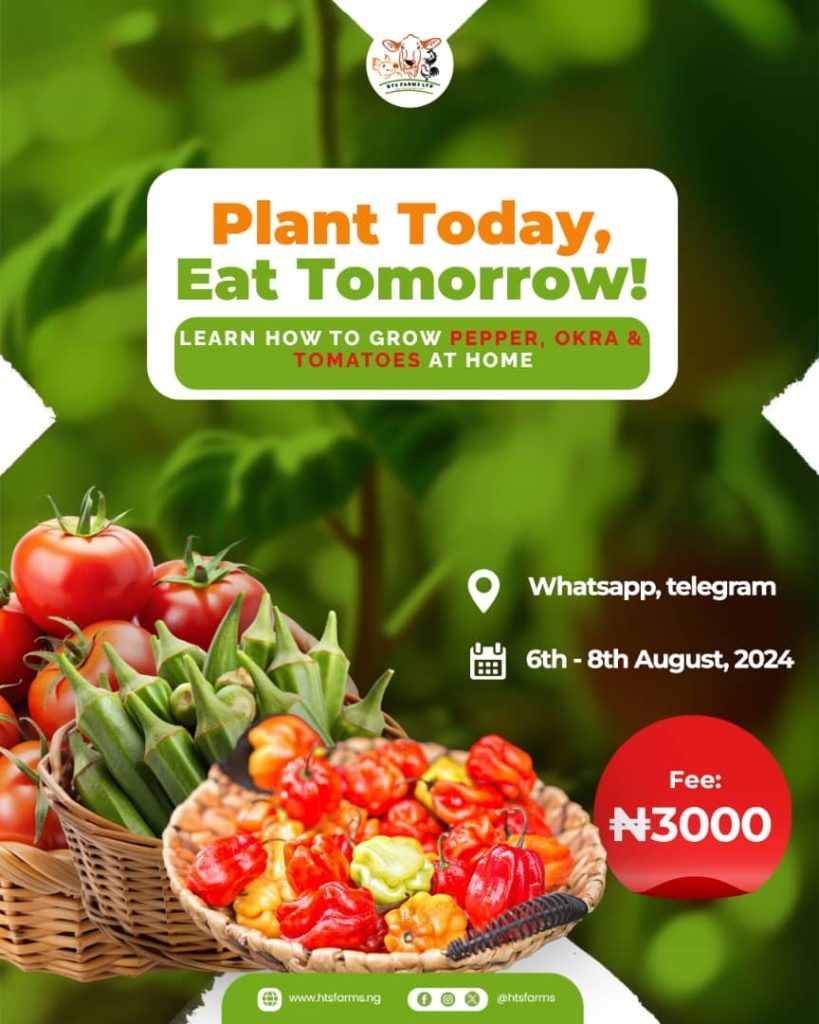
The Rising Cost of Food in Nigeria: A Homegrown Solution
Nigeria is currently facing a critical challenge: the soaring cost of food products. This crisis affects every household, making it increasingly difficult for families to afford essential nutritional staples. At the heart of this issue are vegetables – fundamental components of a healthy diet that are becoming less accessible to the average Nigerian.
In response to this pressing concern, HTSF Global in line with her subsidiary company, HTS Farms has developed an innovative solution. Our “Plant Today, Eat Tomorrow” initiative aims to empower Nigerians with the knowledge and skills to grow their own vegetables at home. This blog post explores the current food price crisis in Nigeria and introduces HTSF’s groundbreaking program designed to tackle this issue head-on.

Join us as we delve into the causes of the crisis, the details of our solution, and how you can be part of this green revolution towards food self-sufficiency. Whether you’re a concerned citizen, a struggling parent, or simply someone interested in sustainable living, this post offers valuable insights into a critical issue affecting millions of Nigerians – and a practical way to make a difference.
Table of Contents:
1. Introduction
2. The Food Price Crisis in Nigeria
2.1 Current State of Affairs
2.2 Causes of the Crisis
2.3 Impact on Nigerian Households
3. HTSF’s Innovative Response: “Plant Today, Eat Tomorrow”
3.1 Program Overview
3.2 Key Features
3.3 Crops in Focus: Pepper, Okra, and Tomatoes
4. Benefits of Home Vegetable Gardening
4.1 Economic Advantages
4.2 Health and Nutritional Benefits
4.3 Environmental Impact
4.4 Educational and Social Value
5. Getting Started with HTSF’s Program
6. Conclusion
Introduction
In the face of Nigeria’s escalating food prices, HTSF Global has devised an innovative solution that empowers citizens to take control of their food supply. This blog post delves into the current food crisis, introduces HTSF’s groundbreaking “Plant Today, Eat Tomorrow” initiative, and explores how this program could reshape Nigeria’s approach to food security.

The Food Price Crisis in Nigeria
2.1 Current State of Affairs
Nigeria is currently experiencing a significant surge in food prices, with vegetables being particularly affected. This price hike has placed an enormous burden on households, making it increasingly challenging for many to maintain a nutritious diet.
2.2 Causes of the Crisis
Several factors contribute to the current food price crisis:
– Economic instability and high inflation rates
– Supply chain disruptions due to security challenges and poor infrastructure
– Climate change impacts on agricultural productivity
– Rising costs of agricultural inputs and production
– Currency devaluation affecting import prices
2.3 Impact on Nigerian Households
The soaring food prices have led to:
– Reduced purchasing power for essential food items
– Increased food insecurity among vulnerable populations
– Shifts in dietary habits, often towards less nutritious options
– Heightened financial stress on families
– Potential long-term health consequences due to nutritional deficiencies
HTSF’s Innovative Response: “Plant Today, Eat Tomorrow”

3.1 Program Overview
HTSF Global in line HTS Farms has developed the “Plant Today, Eat Tomorrow” initiative, a virtual training program designed to teach Nigerians how to grow vegetables at home. This program aims to address the food price crisis by empowering individuals with the skills to produce their own fresh, nutritious vegetables.
3.2 Key Features
– Accessibility: Training conducted via WhatsApp and Telegram
– Affordability: Priced at 3000 Naira, making it accessible to many
– Convenience: Home-based learning and application
– Expert Guidance: Professional instruction on sustainable gardening techniques
– Community Building: Supportive group chat for knowledge sharing and motivation
3.3 Crops in Focus: Pepper, Okra, and Tomatoes
The program focuses on three staple vegetables in Nigerian cuisine:
– Pepper: Essential for adding flavor and heat to dishes
– Okra: A nutritious vegetable used in many traditional recipes
– Tomatoes: Versatile and widely used in various Nigerian meals
Benefits of Home Vegetable Gardening
4.1 Economic Advantages
Reduced grocery expenses:
Growing vegetables at home can significantly cut down on grocery bills. For instance, a single tomato plant can produce 8-10 kg of tomatoes in a season. Considering the current high prices of vegetables in Nigeria, this could translate to substantial savings. Families can redirect these savings towards other essential needs.
Potential for small-scale entrepreneurship:
As gardeners become more proficient, they may produce more than they need for personal consumption. This excess can be sold to neighbors, local markets, or even restaurants, creating a small income stream. Some participants might even expand their gardens and turn them into small-scale urban farms, contributing to local food security while generating income.
4.2 Health and Nutritional Benefits
Access to fresh, organic produce:
Home-grown vegetables are as fresh as it gets. They can be harvested at peak ripeness, ensuring maximum nutritional value. Unlike store-bought produce that might be days or weeks old, home-grown vegetables retain more vitamins and minerals. Additionally, home gardeners have full control over the growing process, allowing for organic cultivation without harmful pesticides or chemical fertilizers.
Increased consumption of vegetables:

When vegetables are readily available in one’s backyard, people tend to incorporate more of them into their diets. This increased consumption of vegetables can lead to improved overall health, better digestion, and stronger immune systems. It’s also an excellent way to ensure children are eating more vegetables, as they’re often more excited to eat what they’ve helped grow.
Control over pesticide use:
Commercial farming often relies heavily on pesticides to protect crops. However, these chemicals can be harmful when ingested. Home gardeners can choose to use organic pest control methods or minimal, carefully applied pesticides, reducing exposure to these potentially harmful substances.
4.3 Environmental Impact
Reduced carbon footprint from food transportation:
The “food miles” – the distance food travels from farm to plate – are drastically reduced with home gardening. This cuts down on transportation-related carbon emissions. In Nigeria, where infrastructure challenges can make food transportation particularly carbon-intensive, this reduction can be significant.
Promotion of biodiversity in urban areas:
Home gardens create green spaces in urban environments, providing habitats for various insects, birds, and small animals. This increased biodiversity can help balance local ecosystems. Additionally, growing different varieties of vegetables can help preserve crop diversity, which is crucial for long-term food security.
Decreased packaging waste:
Store-bought produce often comes wrapped in plastic or packaged in containers. Home-grown vegetables eliminate this packaging waste, reducing the amount of plastic and other materials ending up in landfills or, worse, in Nigeria’s waterways and oceans.
4.4 Educational and Social Value
Skill development in agriculture and sustainability:

Participants in the program will gain valuable skills in agriculture, including soil preparation, planting techniques, pest management, and harvesting. These skills promote self-sufficiency and can be applied to larger-scale farming if desired. Moreover, learning about sustainable gardening practices increases awareness about environmental issues and sustainable living.
Family bonding through shared gardening activities:
Gardening can be a family activity, bringing parents and children together in a shared project. It provides opportunities for teaching responsibility, patience, and the value of hard work. Watching plants grow from seeds to fruit-bearing plants can be a rewarding experience for all family members.
Community building and knowledge sharing:
The WhatsApp group creates a virtual community where participants can share their experiences, ask questions, and offer advice. This fosters a sense of community and mutual support. As participants become more experienced, they can share their knowledge with neighbors and friends, spreading the benefits of home gardening throughout their communities.
These detailed benefits showcase how HTSF’s “Plant Today, Eat Tomorrow” initiative goes beyond just addressing food prices. It has the potential to transform individuals, families, and communities, promoting healthier, more sustainable, and more connected ways of living.
Getting Started with HTSF’s Program
To join the “Plant Today, Eat Tomorrow” initiative:

Join the WhatsApp group: https://chat.whatsapp.com/CiAPFawQGOG5bMk1ypnvQQ
Pay the 3000 Naira fee (payment details provided in the group)
Prepare for the three days training starting from August 6, 2024 to August 8, 2024
Gather basic gardening supplies as advised by the program
Conclusion
HTSF’s “Plant Today, Eat Tomorrow” program offers a practical, grassroots solution to Nigeria’s food price crisis. By empowering individuals to grow their own vegetables, this initiative not only addresses immediate food security concerns but also lays the groundwork for a more sustainable and resilient food system in Nigeria. Join us in this green revolution and take the first step towards food self-sufficiency!
REFERENCES
1. Food and Agriculture Organization of the United Nations. (2023). “Food Price Index.” http://www.fao.org/worldfoodsituation/foodpricesindex/en/
2. World Bank. (2023). “Nigeria Economic Update.” https://www.worldbank.org/en/country/nigeria/publication/nigeria-economic-update
3. Mgbenka, R. N., et al. (2021). “Urban Agriculture as a Strategy for Poverty Alleviation in Nigeria.” Journal of Agricultural Extension, 25(1), 58-70.
4. Ojo, E. O., & Adebayo, P. F. (2022). “Food Security and Poverty Alleviation in Nigeria: The Role of Urban Agriculture.” African Journal of Food, Agriculture, Nutrition and Development, 22(1), 19235-19256.
5. Akinbile, L. A., & Oladoja, M. A. (2020). “Perceived Effects of Climate Change on Agricultural Production among Urban Farmers in Lagos State, Nigeria.” Journal of Agricultural Extension, 24(2), 1-12.
6. Olawepo, R. A. (2021). “Food Security and Challenges of Urban Agriculture in Developing Countries: A Case Study of Ilorin, Nigeria.” International Journal of Social Sciences and Management Review, 4(2), 244-256.
7. Adebayo, A. G., et al. (2022). “Urban Agriculture and Food Security in Nigeria: Challenges and Prospects.” Journal of Agriculture and Food Research, 7, 100264.
8. World Health Organization. (2023). “Increasing fruit and vegetable consumption to reduce the risk of noncommunicable diseases.” https://www.who.int/elena/titles/fruit_vegetables_ncds/en/
9. Orsini, F., et al. (2020). “Exploring the production capacity of rooftop gardens in urban agriculture: the potential impact on food and nutrition security, biodiversity and other ecosystem services in the city of Bologna.” Food Security, 12(6), 1361-1377.
10. Eigenbrod, C., & Gruda, N. (2021). “Urban vegetable for food security in cities. A review.” Agronomy for Sustainable Development, 35(2), 483-498.
